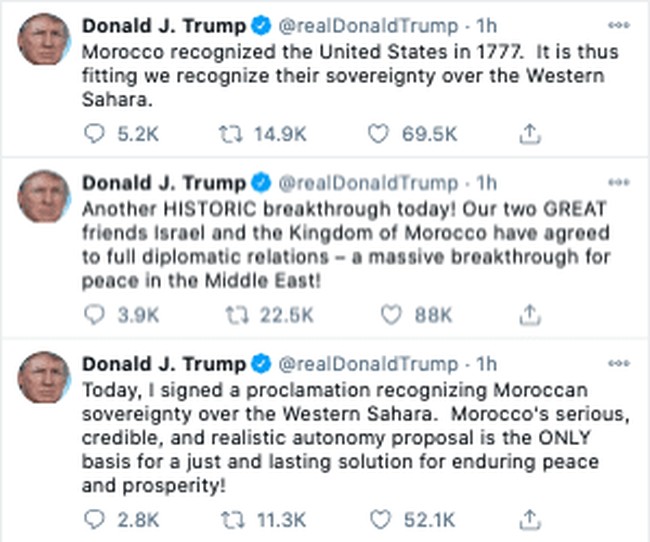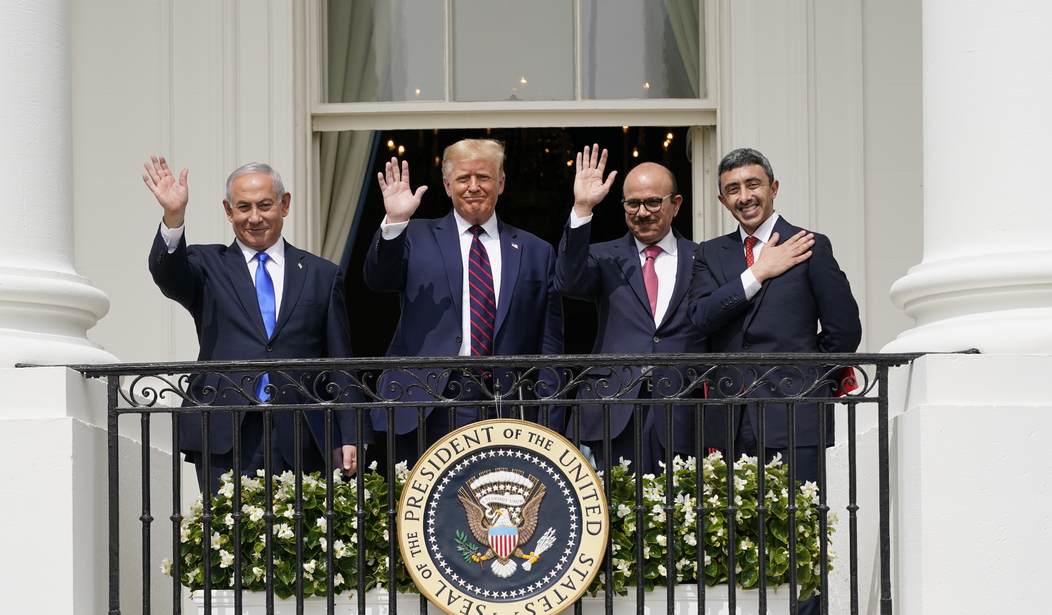On Thursday, President Donald Trump announced that the North African Muslim-majority nation of Morocco would normalize relations with Israel, marking yet another massive diplomatic breakthrough in the Middle East thanks to Trump’s strategy and negotiations.
“Another HISTORIC breakthrough today! Our two GREAT friends Israel and the Kingdom of Morocco have agreed to full diplomatic relations – a massive breakthrough for peace in the Middle East!” the president tweeted.
America gave Morocco an important concession as part of the deal.
“Today, I signed a proclamation recognizing Moroccan sovereignty over the Western Sahara,” Trump added. “Morocco’s serious, credible, and realistic autonomy proposal is the ONLY basis for a just and lasting solution for enduring peace and prosperity! Morocco recognized the United States in 1777. It is thus fitting we recognize their sovereignty over the Western Sahara.”

Spain decolonized Western Sahara in 1975, giving Morocco and Mauritania joint administration of the territory. During a war between Morocco, Mauritania, the Sahrawi nationalist movement, and the Polisario Front, Mauritania relinquished control over the territory in 1979 and Morocco secured de facto control of about 80 percent of Western Sahara, with the Sahrawi nationalist movement controlling the rest.
American acknowledgment of Morocco’s rule of Western Sahara is a major diplomatic coup for the North African nation, but Trump was also right to cite Morocco’s early recognition of the United States. On December 20, 1777, Morocco became the first country in the world to recognize American independence. Morocco would later join the Barbary States in the First Barbary War (1801-1805) against the United States.
Morocco itself has a fascinating history. Christopher Columbus connected Europe with the Americas after King Ferdinand of Aragon and Queen Isabella of Castille united Spain and expelled the Muslim rulers from Granada in 1492 in the Reconquista. After a succession of Arab sultanates ruled Morocco, Spain and France carved out zones of influence in the early 1900s and Morocco finally gained its independence in 1956.
Morocco’s normalization of ties to Israel marks yet another historic step toward peace in the Middle East and North Africa, one of Trump’s greatest achievements as president.
Trump laid the groundwork for these historic deals by pulling out of the Iran deal, strengthening America’s energy independence through oil and natural gas, and moving the U.S. Embassy in Israel to Jerusalem. The assassination of Iranian Quds Force General Qasem Soleimani also played a key role. Trump put a key check on Iran’s influence in the Middle East and skirted the Palestinians’ repeated obstruction of diplomatic progress. This opened the floodgates for Arab-Israeli peace deals as countries like Saudi Arabia began to view Israel as a potential ally against Iran.
In the Abraham Accords, Bahrain and the United Arab Emirates (UAE) normalized relations with Israel. Shortly before the Abraham Accords, Trump brought Muslim-majority Kosovo and Christian-majority Serbia together for a historic agreement that included promises to set up embassies in Jerusalem. Last month, Sudan — which recently ousted a dictator who had supported terrorism for decades — normalized relations with Israel.
Before the Abraham Accords, Bahrain and Saudi Arabia announced they would open their skies to Israeli flights to the UAE. As part of its rapprochement with Israel, the UAE agreed to order hotels to serve Kosher foods in Abu Dhabi, delivering a powerful symbol of Jewish acceptance in a notoriously anti-Semitic part of the world.
These historic diplomatic successes have brought Trump multiple Nobel Prize nominations. The Trump administration also appears to be aiming for one last major breakthrough: an agreement between Saudi Arabia and Israel, which would be the jewel in the Trump administration’s Middle East policy crown.
If Joe Biden does indeed enter the White House next month (as seems likely, though Trump is still contesting the election), this progress in the Middle East may represent one of Trump’s most important legacies. While Biden will undermine much of Trump’s progress, the fact that Morocco was willing to make this move after the president appears to be on his way out illustrates that Trump’s new Middle East may be here to stay, regardless of Biden’s desperate attempts to restore the status quo.
Editor’s Note: Want to support PJ Media so we can continue telling the truth about the 2020 election? Join PJ Media VIP TODAY and use the promo code LAWANDORDER to get 25% off your VIP membership.
Tyler O’Neil is the author of Making Hate Pay: The Corruption of the Southern Poverty Law Center. Follow him on Twitter at @Tyler2ONeil.









Join the conversation as a VIP Member